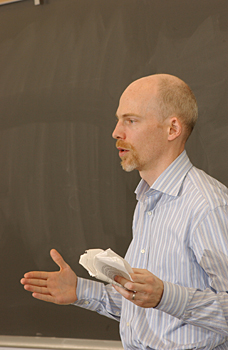Worth's talk, “Reporting from Baghdad: Life Outside the Green Zone,” was presented to a standing-room-only audience during a journalism class taught by McKay Jenkins, Cornelius A. Tilghman Professor of English, on April 30 in Gore Hall.
During the talk, Worth highlighted the ever-escalating level of deadly sectarian violence between Sunni and Shiite insurgents. He also spoke of the changes reporters have had to make in covering such a chaotic situation.
“Reporting from Iraq is a little different from reporting in other places,” Worth said. “What you see depends entirely on who you are.”
Worth said that when he arrived in Iraq after the invasion, Times' staffers lived in a “beautiful” house by the Tigris River. He also noted that getting around Baghdad was not that much of a problem for reporters.
“At that time, you could get into the country by driving over the border from Kuwait or Jordan. You got in a Land Rover and had a long, long drive in the desert,” Worth said. “Cars went up and down the street outside our house, and reporters could pretty much drive anywhere they wanted in Baghdad.”
When Worth returned to Baghdad in 2004 after a brief hiatus, he saw that things had changed drastically in terms of access and the way in which Americans and coalition forces were regarded by the average Iraqi.
“Even our house was different. We now had numerous checkpoints and an enormous staff of guards overseen by a former member of the British military,” Worth said. “We often had to go around cities. We had to think carefully about what time of day it was and what a particular U.S. military unit was doing.”
The image of the U.S.-led coalition also changed from that of liberator to that of an occupying force in the view of many Iraqi citizens who had initially cheered the overthrow of Saddam Hussein.
“We were amazed at what the invasion meant to these people. The invasion was really a liberation for them,” Worth said. “Things began to change in late 2003. After this, even those who were the most enthusiastic about the American-led invasion began to change their minds.”
In Iraq, 60 percent of the population is Shiite, 20 percent Sunni and 20 percent Kurd, and while many Iraqis at first managed to avoid getting caught up in the sectarian violence, they eventually began to identify more and more with their own particular tribe, Worth said.

“The bombing was the point at which the dam broke,” Worth said. “Before that, the Shiites had been urged not to strike back. After the bombing, the Shiites came out and randomly started rounding up Sunnis and killing them.”
Worth said that with 2 million Iraqi refugees in surrounding countries, getting a visa has become extremely difficult, if not impossible, for most Iraqis.
“An Iraqi who had left and then returned to Iraq said that 'No one gives visas to Iraqis,'” Worth said. “He added that 'We [Iraqis] have become like a disease.'”
Another casualty of the sectarian violence, Worth said, is that reporters are no longer able to cover the same areas in which they once moved quite freely.
“We knew that we could be killed in these neighborhoods,” Worth said. “There was no way to report on the reality of what was going on in those neighborhoods.”
When asked if his views on the situation in Iraq had changed since his arrival in 2003, Worth replied, “At first, we saw that things had improved tremendously. I believe that it could have worked out if tremendous mistakes were not made after the invasion.”
Worth also was asked if he believed there was any hope of Iraq returning to some semblance of normalcy with some kind of political settlement that would satisfy all parties to the conflict.
“My own thoughts on this are that maybe it will be like what happened in Lebanon years ago, when all the parties just got tired of the whole thing,” Worth said. “Maybe it will be through provincial elections, something that [President George W.] Bush is pushing now. You might get some kind of summit, maybe some chance for a framework where power could be shared.”
Article by Jerry Rhodes
Photos by Duane Perry



